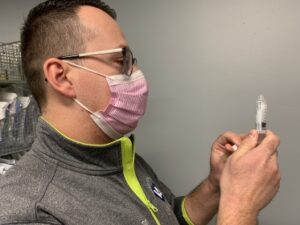MILWAUKEE — In August 2021, the medical device distributor Cardinal Health recalled approximately 267 million of their prefilled saline syringes. The syringes had been found to reintroduce air into the syringe after it had been expelled, which could have resulted in the injection of air into blood vessels, leading to serious injury or death.
The recall came before any injuries were reported and happened in part due to the eagle eye of one VA nurse at the Milwaukee VA Medical Center.
Jeremy Sauld, RN, hadn’t always wanted to be a nurse. Prior to 2009, he had a job in manufacturing but was looking for something different.
“I was working in a metal shop, and I just didn’t want to work in a factory for the rest of my life,” Sauld explained.
Seeing friends struggling with aging parents and escalating health issues, Sauld recognized that he also understood little about medicine, the human body or healthcare in general. He was inspired to correct that and decided to train for a career in medicine. Nursing seemed like the role that provided the broadest opportunity and, by 2009, his training complete, he embarked on a new career.
His first job was at Aurora St. Luke’s Medical Center in Milwaukee, where he was eventually asked to join the vascular access team, the hospital’s experts in handling vascular access devices like IVs and catheters. Sauld thrived in that role, so much so that in 2014 he was recruited by a device manufacturer to act as a nurse educator. He traveled the entire state of Wisconsin and the Upper Peninsula training nurses at hospitals on how to use the company’s vascular access devices. The job allowed him to become the expert’s expert on vascular access techniques, having to demonstrate procedures over and over and watch over others as they learned.
After six years of traveling, now married and with a daughter, Sauld wanted to settle down. A manager at the Milwaukee VAMC offered him the opportunity to help expand the vascular access team there.
“It helped me in my personal life to provide a work-life balance, and VA has an amazing patient population,” Sauld said.
He was only there a few weeks when he encountered an alarming problem while preparing to insert an IV into a patient.
“One part of [starting an IV] is opening an IV start kit [and] connecting it to the saline flush syringe. Then we push saline all the way through the tubing so it’s ready to connect to the IV,” Sauld explained.
Sauld had connected the syringe, pushed the saline and then placed it on the table beside him where it would be ready when he needed it. As he watched, he saw the syringe’s plunger begin to move, the saline slowly retracting backward through the tubing.
“That means there was air collecting through the tubing,” Sauld explained. “As I looked at it, I saw air bubbles forming all the way through the tubing and forming at the tip of the syringe. Anybody in healthcare who starts IVs knows you don’t ever want to push air through into a patient.”
He reprimed the tubing, clamping it so that the saline couldn’t retract and air couldn’t get back in, and finished starting the IV. Then he went investigating.
He found a couple more of the same type of IV start kits and tried out their syringes. He got the same result. Was it just the one box, or did the problem spread further?
Sauld found Tracy Sanicola, RN, quality coordinator for the vascular access team and told her about his discovery.
“We started by going down to materials where we get all our supplies and looking through a couple different boxes,” Sauld said. “Every box we opened along the way did the same thing.”
What happened next was quick.
“We basically started reaching out to everybody and anybody who would listen. Our leadership, nurse educators within VA, nursing professional development coordinators—it was pretty amazing how quickly the whole thing progressed through to finding a solution.”
Within two days, the hospital had secured and removed 16,000 defective syringes. Word of the incident spread further. Sauld reported the defective syringes through FDA’s MedWatch program and through an internal VA group email used by vascular access nurses across the country. Sauld was contacted by someone from VA’s National Center for Patient Safety, who made sure purchasers at the national level were aware of the problem.
“It was cool to see that there were so many people listening and paying attention,” Sauld said. “To this day, I don’t know if one specific route was the route that got this done.”
As for why Sauld was the first one to notice the problem at his facility, part of the reason could come from his years not only using vascular access devices but training others to do so, as well.
“When I’m caring for patients, attention to the smallest detail can make a huge impact,” Sauld noted. “And you really try to pay attention to details when you’re teaching, so you can be ahead of them. You want to prevent anything bad from happening.”
For his role in preventing any patient injuries and eventually getting the syringes recalled, Sauld was nominated for and received a VA HeRO award, though he’s quick to note that there were many others on his team and throughout the hospital that worked to secure the devices.
“There’s people that deserve the award more,” he declared. “There’s so many heroes around this place doing the work every day.

